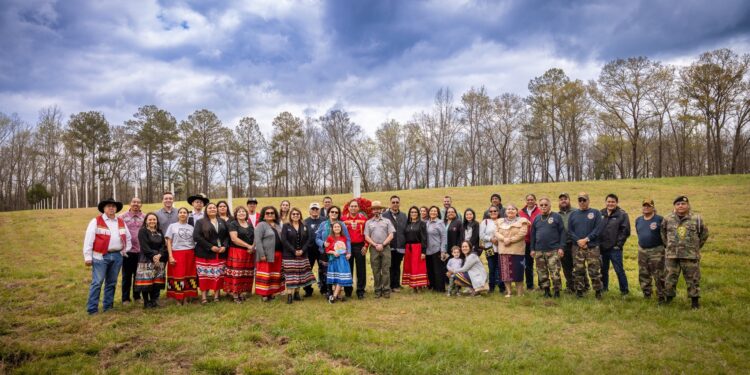DAVISTON, Ala.- Wednesday, March 27 marked the 210th anniversary of the Battle of Horseshoe Bend. Muscogee (Creek) Nation Tribal leaders, dignitaries and community members commemorated the event at the Horseshoe Bend National Military Park during the site’s annual memorial event on March 22-23.
The National Park Service, which runs the site, held its annual memorial activities which included educational programming for local elementary children, Mvskoke arts and crafts booths, and cultural and educational information.
On Saturday, after speeches, song, and prayer 857 luminaries were placed on the battle site to remember the men, women, and children who died there.
Raelynn Butler, MCN Secretary of Culture and Humanities, traveled with the MCN delegation and related the solemn, reflective nature of the trip. “This was many people’s first time at the park and it was very moving and emotional to hear this difficult history and be at this sacred place, the last resting place of more than 857 Mvskokvlke who died here,” Butler said.
National Council Representative Dode Barnet attended the commemoration this year and spoke about the trip as profound. She stated, “It’s a really heavy experience to stand somewhere where you know that something so horrible happened. I mean, the battle is quite heroic. The Red Stick Warriors were smart, capable, fierce warriors. And I think that they were so intelligent with the barricade that they built… but to realize that children and women and elders were also killed…And so, it is a heavy thing. It is a really heavy thing.”
“Fight the good fights, simply because it is right to do so. Division gave birth to the atrocities committed here 210 years ago. Unity can once again heal us. Because it remains as true today as it was two centuries ago – we are better together.” Principal Chief David Hill
Secretary Butler shared the importance of a continued Mvskoke presence at the site, relating that the Nation is working toward placing a Mvskoke memorial there. She said, “We are working to get approval to place a monument at the park to honor our ancestors who fought, died, and survived the battle. The park has a monument for Andrew Jackson but there is nothing similar for us.”
The 1814 battle led to the massacre of over 800 warriors, women, and children at the fortified village of Tehpeka, located on a peninsula along the Tallapoosa River in Alabama. The battle ended the Creek War and led to land cessations of 23 million acres and catapulted General Andrew Jackson to national prominence.
On this history, Chief Hill related that it ultimately united Mvskokvlke. In his keynote address during the commemoration ceremony, he said, “The slaughter of men, women and children at Horseshoe Bend launched Andrew Jackson to fame and ultimately the Presidency, where he signed the Indian Removal Act in 1830. However, in seeking to divide and destroy us, the U.S. Government ultimately united us. Bound by shared anguish, our ancestors endured the Trail of Tears and the early years in Oklahoma. Combined, these events caused the death of 8,000 of our people. We stood together to battle allotment policies and unflaggingly confronted every effort to extinguish our Nation.”
To view Chief Hill’s full speech, go here.
To view remarks from the ceremony, including Ambassador Jonodev Chauduri’s address, go here.





